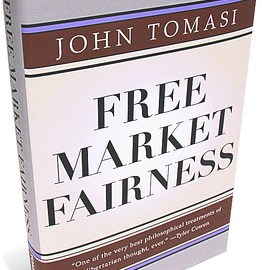Individual Freedom and Social Justice

Adam Wolfson calls our attention to an important new book by political theorist John Tomasi. Against partisans on both sides, Tomasi claims that Free Market Fairness is hardly an oxymoron.
Against liberals or followers of John Rawls, Tomasi defends the intrinsic goodness of eonomic liberty. People really do want to plan their own lives, and that means being responsible for their own economic well-being. Those who speak of “social justice” often do so to justify paternalistic policies that restrict personal freedom and produce a more conformist society. Economic liberty is a fundamental feature of personal dignity. And both Rawlsians and “Christian Democrats” slight that irreducible feature of who we are.
On the other hand, any defense of genuine personal liberty includes an account of who we are as social, relational, and political beings. Libertarian conservatives from Hayek to Glenn Beck sneer at the phrase “social justice,” because it allegedly always subordinates the free individual to arbitrary and tyrannical commands on behalf of some imaginary social whole. I am not, libertarians shout, part of some whole beyond myself. The only reality is free individual choice. But that extreme claim is clearly untrue. As social beings, we have undeniable duties to others that we should affirm in the spirit of gratitude. As rational beings, our social lives include political deliberation about justice—or not just some pseudo-Darwinian reliance on the unconscious emergence of “spontaneous order.”
John Locke’s defense of property rights wasn’t only about individual liberty. His moral argument was mainly that everyone would be better off. Not only “the industrial and rational” who would own and develop lots of property but the ordinary “day laborer” or wage earner would have more and more of the good things of life. Property rights are indefensible if the overwhelming majority of people don’t benefit from them.
Locke said, of course, that a world properly formed by the ideas of property and money would include considerable economic inequality. But he explains—in a democratic fashion—why it’s reasonable for everyone to consent to that inequality. The limit of individual liberty is always consent, and the institution of government and even money depends on everyone being able to consent freely and equally.
So when individual liberty produces a society in which the lives of ordinary workers are getting too contingent and too chaotic, then a democratic remedy, even Locke would admit, might be perfectly appropriate. Libertarians always claim, of course, that all our social pathologies are caused by excessive government involvement and welfare entitlements. But that’s, at best, only partly true today. The spirit of individualism is also partly to blame, as it erodes all the safety nets—public and private—that have assisted us in living dignified personal lives.
Ironically, I might add, both our liberals and our libertarians are too careless of the social capital that’s indispensable for personal dignity. Neither sems to give a moment’s thought to the possible negative effects of a free economy—especially when its standards of contract and consent seem to be reconstructing far too much of social and relational life—on social institutions such as the family, the local community, and the church (or the social institution that is organized religion).
Tomasi, quite reasonably, says that fairness or justice demands that every American have access to affordable health care. But he adds that any and all public solutions should be as market-based and so choice-based as possible. Not only are such solutions more efficient, they correspond better to the whole truth about who we are as free persons.
I can add, of course, that market-based solutions are also good for religious freedom, for protection of the church’s institutional integrity against government mandates. Christians too devoted to “social justice” often confuse charity with big government, thoughtlessly surrendering some of their freedom to encourage the personal practice of virtue in the process.





